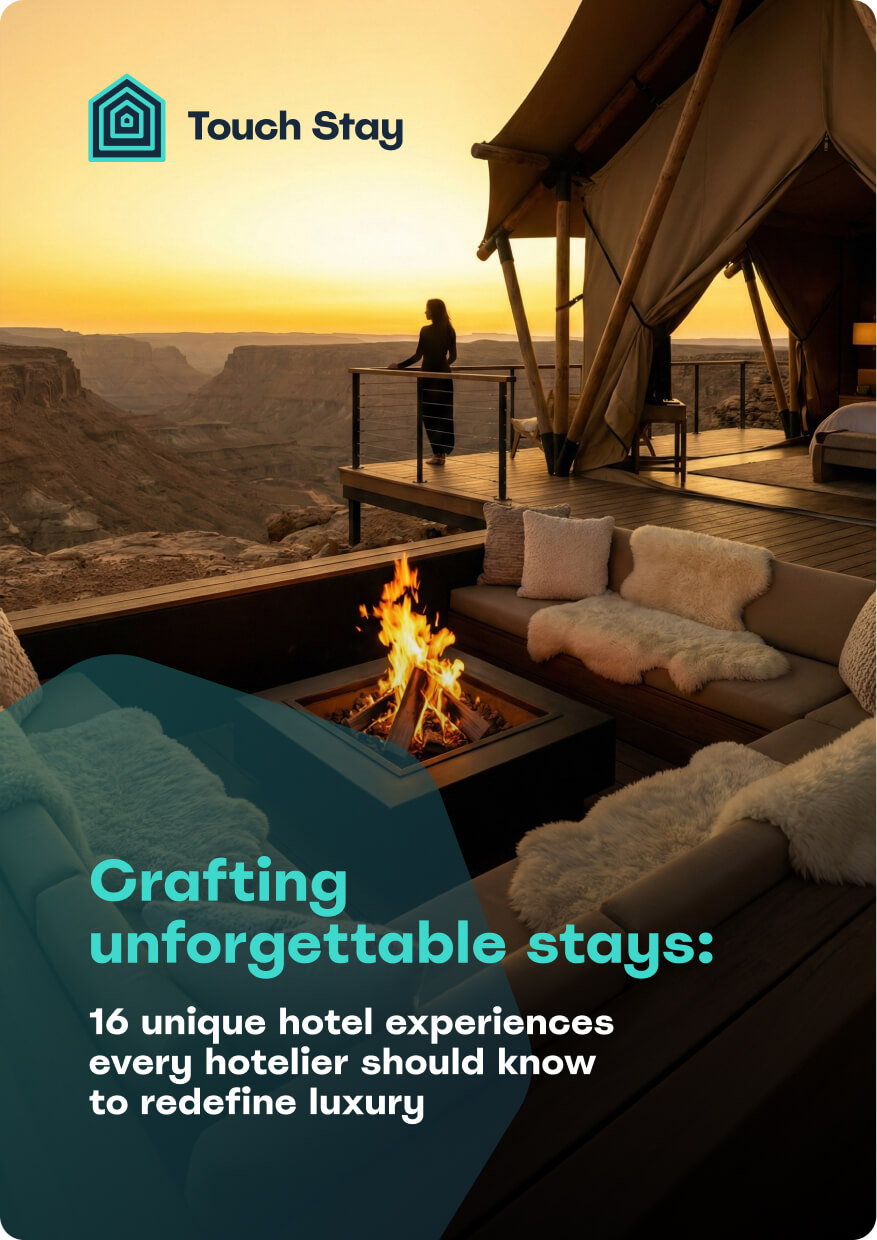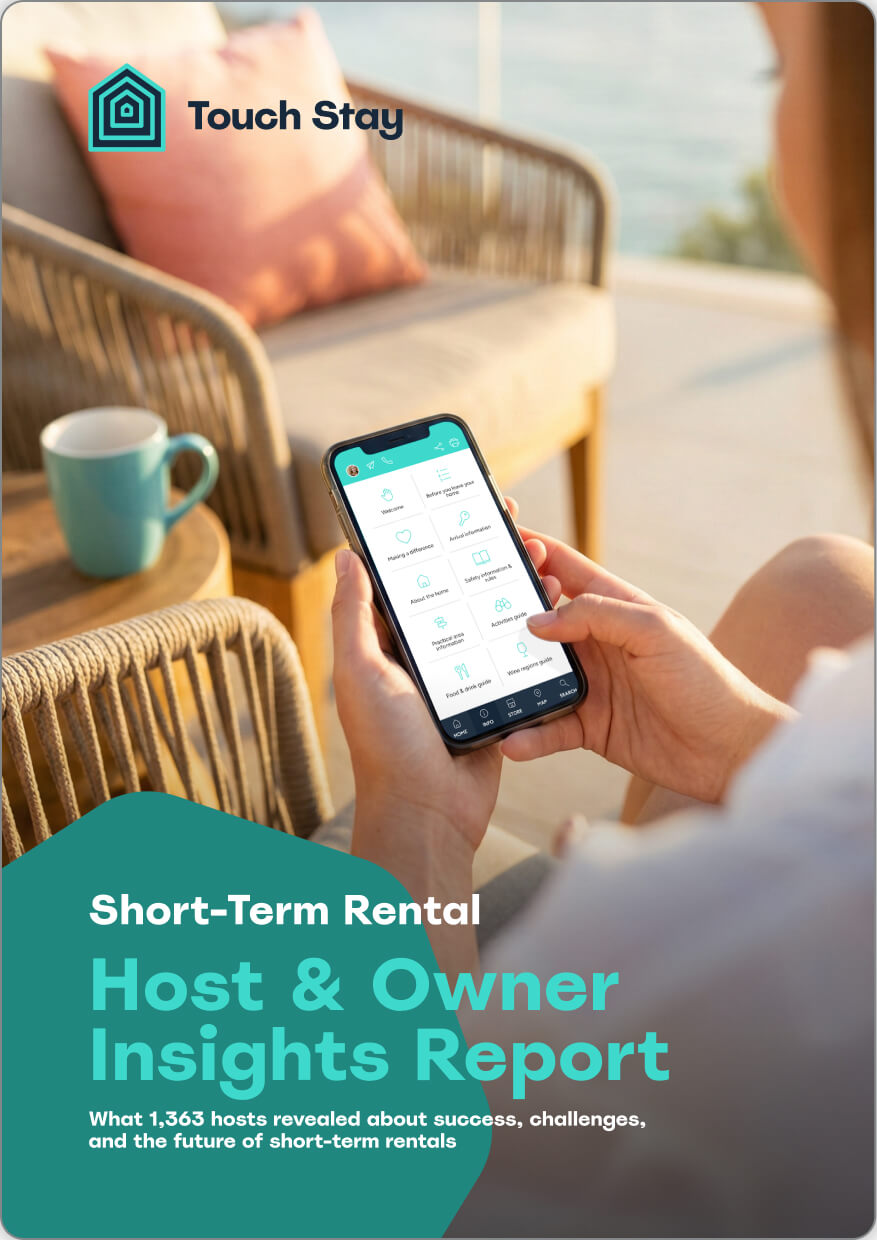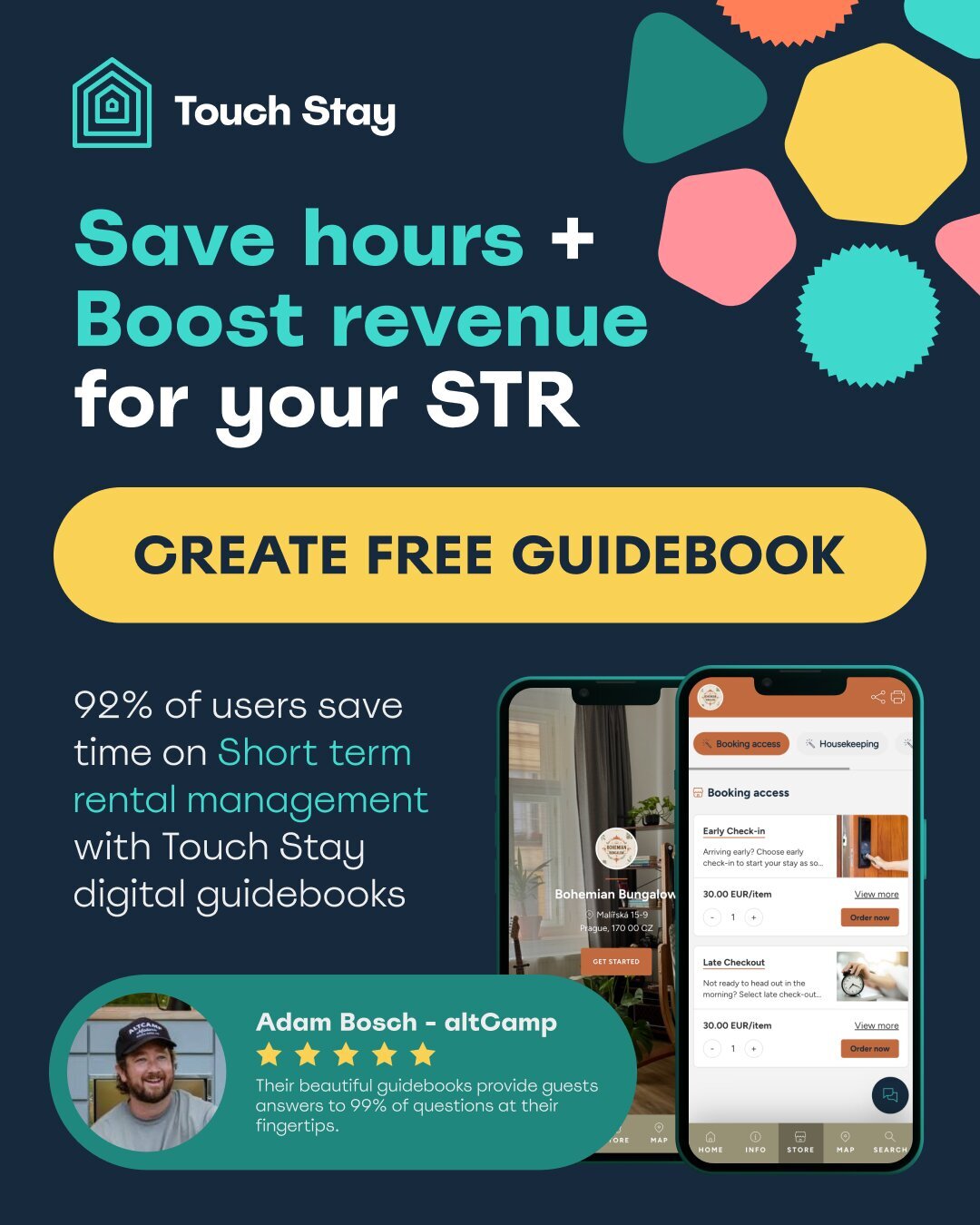Are you considering becoming an Airbnb host and wondering about the requirements or how to get started?
This comprehensive guide will walk you through everything you need to know to become a successful Airbnb host in 2024, from understanding Airbnb qualifications and navigating Airbnb rules for hosts, to understanding the potential income, setting up your listing and creating a memorable guest experience.
- Is Airbnb hosting profitable?
- Airbnb hosting options: which is right for you?
- Airbnb host requirements: what you need to know
- Ground rules for Airbnb hosts
- How to get your property on Airbnb: a step-by-step guide
- FREE Airbnb hosting checklist
- How to become a host for Airbnb: a step-by-step guide
- Creating a memorable guest experience
- Maximising your Airbnb earnings
Is Airbnb hosting profitable?
Before becoming an Airbnb host, it's important to evaluate potential profitability. While running an Airbnb can be lucrative, understanding the factors that influence earnings is essential.
A 2023 report by AirDNA revealed over 6.4 million Airbnb listings worldwide, showcasing the platform's popularity, while a 2022 study by Money Digest found that the average Airbnb host earns around $924 per month. However, income varies based on location, property type, and other factors.
Consider the following when evaluating if Airbnb hosting is right for you:
- Time commitment: while Airbnb hosting can be flexible, it does require time and effort to manage your listing, communicate with guests, and maintain your property.
- Startup costs: there may be some upfront costs associated with Airbnb hosting, such as furniture, linens, and cleaning supplies.
- Local regulations: there may be regulations in your area that affect short-term rentals. It’s important to do your research to ensure you are compliant with all local laws.
Airbnb hosting options: which is right for you?
While the ideal hosting option depends on factors like your property type, lifestyle, and goals, here's a general breakdown based on potential profitability:
Entire place
- Potential for highest earnings: guests often pay more for an entire property.
- Factors affecting profitability: location, amenities, and demand.
- Example: a well-located, fully furnished property in a popular tourist destination could command premium rates.
Private room
- Moderate earnings potential: guests generally pay less than for an entire place.
- Factors affecting profitability: location, amenities, and the shared space's appeal.
- Example: a cosy room in a historic home with access to a shared garden and kitchen might attract budget-conscious travellers.
Shared room
- Lowest earnings potential: guests typically pay the least for a shared room.
- Factors affecting profitability: location, amenities, and the overall appeal of the shared space.
- Example: a spare bedroom in a student housing area could be a good option for budget travellers.
Experiences
- Earnings potential varies widely: income depends on the type of experience, pricing, and demand.
- Factors affecting profitability: uniqueness of the experience, target audience, and marketing efforts.
- Example: a popular cooking class or guided tour in a popular tourist destination could generate substantial income.
Note: while entire places generally have the highest earning potential, factors like location, amenities, and demand can significantly impact profitability for all options. It's essential to research your local market and consider your specific circumstances when choosing a hosting strategy.
Additional considerations:
- Occupancy rates: higher occupancy rates generally lead to higher earnings.
- Guest reviews: positive reviews can attract more bookings and increase your rates.
- Operating costs: factor in expenses like cleaning, utilities, and maintenance when calculating your profitability.
- Tax implications: be aware of local regulations and tax implications for short-term rentals.
By carefully evaluating these factors, you can choose the Airbnb hosting option that best aligns with your goals and maximises your earning potential.
Airbnb host requirements: what you need to know
To become an Airbnb host, you'll need to meet specific requirements and understand Airbnb rules for hosts. These include:
- Legal and regulatory compliance: research local laws and regulations related to short-term rentals. Obtain necessary permits and licences.
- Property suitability: ensure your property meets Airbnb's quality standards and safety guidelines.
- Host profile: create a compelling host profile highlighting your experience and commitment to guest satisfaction.
Ground rules for Airbnb hosts
Before you become an Airbnb host, it's important to familiarise yourself with Airbnb's hosting policies and guidelines. These policies are designed to ensure a positive experience for both hosts and guests. Here are some of the key things to keep in mind:
- Be a responsible host: Airbnb requires hosts to comply with all local laws and regulations. You must also be respectful of your neighbours and be prepared to address any noise complaints.
- Be transparent: your listing should accurately describe your property, amenities, and house rules.
- Be responsive: it's important to communicate promptly with guests before, during, and after their stay. Touch Stay’s Airbnb integration lets you automate all your guest communication, meaning you can relax, safe in the knowledge your guests have all the info they need.
- Provide a great guest experience: your goal is to provide your guests with a clean, comfortable, and enjoyable stay.
In addition to Airbnb's policies, it's crucial to familiarise yourself with local laws and regulations governing short-term rentals. These can vary significantly from place to place, so it's essential to research specific requirements for your area.
Here are some resources and examples of potential regulations:
United Kingdom
- Planning permission: in some areas, you may need planning permission to operate a short-term rental, especially if you're converting a residential property.
- Business rates: if your short-term rental business exceeds a certain threshold, you may need to register for business rates.
- Tax: you may need to pay income tax or VAT (Value-Added Tax) on your rental income.
- Noise and disturbance: local councils often have regulations regarding noise and disturbance. It's important to be mindful of neighbours and avoid excessive noise.
Click here to check out the UK’s Short Term Accommodation Association (STAA) regulations.
United States
- Zoning laws: zoning regulations determine what types of land uses are allowed in specific areas. Some cities or neighbourhoods may have restrictions on short-term rentals.
- Occupancy taxes: many cities and states impose occupancy taxes on short-term rentals.
- Short-term rental registration: some jurisdictions require short-term rental hosts to register their properties.
- Noise and disturbance: similar to the UK, noise and disturbance regulations are common in the US.
Click here to see the National League of Cities (NLC) short-term rental regulations.
European Union
- VAT: VAT is generally applicable to short-term rental income within the EU.
- Local regulations: individual EU countries may have specific regulations regarding short-term rentals, such as planning permission, licensing requirements, and taxation.
Click here to read the European Parliament’s latest rules for a responsible and transparent short-term rental sector.
Useful resources:
- Local government websites: check the websites of your local council or city government for information on short-term rental regulations.
- Airbnb Help Centre: Airbnb's Help Centre often provides guidance on local laws and regulations.
- Online forums and communities: connect with other Airbnb hosts in your area to discuss local regulations and best practices.
By understanding and complying with local laws and regulations, you can avoid legal issues and ensure a smooth and successful short-term rental experience.
How to get your property on Airbnb: a step-by-step guide
Now that you've decided to become an Airbnb host, it's time to get your property listed! Here's a step-by-step guide to walk you through the process:
-
Competition Research
Before you list your property, it's important to do your research on the competition and the local market. Take a look at other Airbnb listings in your area to see what amenities they offer:
- Identifying competitors: use Airbnb’s search function to find similar properties in your area.
- Analysing listings: study their photos, descriptions, amenities, and pricing.
- Understanding demand: look for patterns in occupancy rates, pricing trends, and popular amenities.
This information will help you position your property effectively and set competitive rates.
-
Research the legal part
Understanding the legal landscape is essential to avoid issues down the line.
- Check local regulations: research specific rules for short-term rentals in your area. This includes zoning laws, occupancy limits, and tax requirements.
- Obtain necessary permits: if required, apply for the appropriate permits or licences for short-term rentals.
- Consider insurance: explore insurance options that cover short-term rentals, as standard homeowners insurance might not suffice.
Helpful resources for legal information include:
- Airbnb's resource centre: offers guidance on legal and regulatory matters.
- Local government websites: provides information on zoning, permits, and taxes.
-
Initial investment, furniture, etc.
Transforming your space into a welcoming Airbnb requires careful planning.
- Budgeting: determine how much you're willing to invest in your property. Consider costs for furniture, linens, cleaning supplies, and potential renovations.
- Furniture selection: choose durable and comfortable furniture that aligns with your property's style. Investing in quality pieces can enhance guest experience and longevity.
- Essential amenities: provide essential amenities like Wi-Fi, kitchenware, and toiletries. Consider offering additional amenities to stand out from the competition.
Remember: the initial investment can vary widely based on your property's condition and desired amenities.
Airbnb hosting checklist
Download our FREE Airbnb hosting checklist to hit the ground running when becoming an Airbnb host in 2024.
How to become a host for Airbnb: a step-by-step guide
- Create an Airbnb account: sign up for a free Airbnb account as a host.
- Understand Airbnb rules for hosts: familiarise yourself with Airbnb's policies to ensure compliance.
- List your property: provide detailed information about your property, including location, photos, amenities, and pricing.
- Write a compelling description: highlight unique features and create an engaging story about your space.
- Set clear house rules: outline expectations for guests, such as check-in/out times, noise policies, and pet restrictions.
- Choose your pricing strategy: determine your nightly rates, considering factors like location, seasonality, and competition.
- Set up your calendar: indicate availability for bookings.
- Verify your listing: Airbnb might require additional verification steps, such as photo verification or government-issued ID.
- Provide exceptional guest experiences: deliver outstanding hospitality to encourage positive reviews and repeat bookings.
Once your listing is live, start engaging with potential guests and building positive reviews.
Remember: high-quality photos are essential for attracting guests! Invest time in capturing your property's best angles and features.
Creating a memorable guest experience
A standout guest experience is crucial for attracting repeat bookings, positive reviews, and ultimately, higher earnings. Here's how to create a memorable stay for your guests:
Provide a warm welcome
- Personalised greeting: a handwritten welcome note with local tips or recommendations creates a personal touch.
- Welcome amenities: small gifts like local snacks, drinks, or toiletries enhance the arrival experience. Check out this fantastic example guidebook where upsells are offered.
- Clear communication: provide essential information about the property, Wi-Fi, and local attractions.
Prioritise cleanliness and comfort
- Immaculate space: ensure your property is spotless, from linens to bathroom fixtures.
- Comfortable bedding: invest in high-quality mattresses, pillows, and linens for restful sleep.
- Functional amenities: provide essential amenities like towels, hairdryer, and iron.
Offer exceptional hospitality
- Responsive communication: be readily available to answer guest enquiries and address concerns. Touch Stay’s First Impressions feature lets you get ahead of any snags by collecting data about the make-or-break first hours of a guest’s stay.
- Local tips: share insider knowledge about local attractions, restaurants, and hidden gems.
- Extra mile services: Consider offering additional services like luggage storage, laundry, or airport transfers. Touch Stay offers the ability for easy upsells to boost revenue effortlessly - let guests pre-book grocery deliveries, offer charcuterie boards, a private chef, beauty treatments, or simply provide your own branded merch for those who want a memento from their trip.
Leverage technology
- Online check-in: streamline the arrival process with digital check-in options.
- Guest reviews: actively manage your guest reviews and respond to feedback.
- Smart home devices: enhance guest experience with smart locks, thermostats, and voice assistants.
Optimise your pricing strategy
- Dynamic pricing: adjust rates based on demand, seasonality, and events.
- Competitive analysis: monitor competitor pricing to stay ahead of the curve.
- Discounts and promotions: offer incentives for longer stays or repeat guests.
Encourage positive reviews
- Exceed guest expectations: go the extra mile to ensure guest satisfaction.
- Promptly address issues: if a problem arises, resolve it quickly and professionally.
- Request reviews: politely ask guests to leave a review after their stay.
Build a strong brand
- Consistent branding: develop a unique brand identity for your property.
- Professional photography: high-quality photos are essential for attracting guests.
- Engaging listing description: highlight your property's unique features and benefits.
By implementing these strategies, you can create a memorable guest experience, build a loyal customer base, and maximise your Airbnb earnings. Remember, every guest interaction is an opportunity to showcase your hospitality and build a successful Airbnb business.
Maximising your Airbnb income
To truly maximise your Airbnb earnings, consider these additional strategies:
Optimise your calendar
- Block out dates: prevent double bookings by accurately reflecting your availability.
- Minimum stay requirements: implement minimum stay requirements during low seasons to increase revenue per booking.
- Dynamic pricing: use Airbnb's Smart Pricing tool to adjust rates based on demand.
Leverage Airbnb's features
- Airbnb experiences: offer unique experiences related to your location to generate additional income.
- Instant book: enable instant bookings to attract guests who prefer a hassle-free process.
- Open homes: participate in Airbnb Open Homes to connect with travellers and potentially generate income.
Stay updated with industry trends
- Market research: continuously analyse market trends to adjust your strategy accordingly.
- Competitor analysis: monitor competitor pricing and offerings to stay competitive.
- Technology integration: embrace new technologies to improve guest experience and efficiency.
Additional income streams
- Photography services: offer professional photography services to capture guests' memories.
- Partnerships: collaborate with local businesses for discounts or packages.
- Upselling amenities: offer additional amenities for a fee, such as airport transfers or in-room massages.
By following these guidelines and understanding the Airbnb qualifications and rules for hosts, you can increase your chances of success in the short-term rental market.
Final thoughts
Consistency is key to building a successful Airbnb business. By providing exceptional guest experiences, optimising your listing, and staying informed about industry trends, you can maximise your earnings and create a sustainable income stream.
Becoming an Airbnb host can be a rewarding venture that offers financial independence and the opportunity to connect with people from around the world. By following the steps outlined in this guide, you can increase your chances of success and build a thriving Airbnb business.
And remember, every host's journey is unique. Be patient, adapt to feedback, and continuously strive to improve your offerings.
Ready to transform your property into a thriving Airbnb business?
Unlock your full potential as a host with Touch Stay's digital guidebooks. Experience the difference a personalised, interactive guide can make for your guests. Discover how to elevate your hosting game:

Ned
Ned has clocked up over 11 years in digital marketing and comms, with a strong focus on creating engaging content for a range of brands and agencies. When he’s not writing, he can be found digging for records, peering through his telescope at the night sky, or onboard his local lifeboat where he volunteers as a crewmember.
Be the first to know!
Join our newsletter for early access to:
- ✅ Free guides
- ✅ Pro tips & tricks
- ✅ Time saving tutorials
- ✅ Latest blog posts
- ✅ Checklists & templates









.png?width=50)












